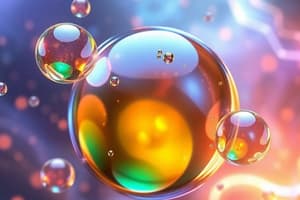Podcast
Questions and Answers
Which of the following is the chemical formula for the phosphate ion?
Which of the following is the chemical formula for the phosphate ion?
- PO4-3 (correct)
- PO2-3
- P2O7-4
- PO3-3
What is the chemical formula for the ammonium ion?
What is the chemical formula for the ammonium ion?
- NH2+
- N4H4+
- NH4+ (correct)
- NH3+
What is the name of the polyatomic ion with the formula SO4-2?
What is the name of the polyatomic ion with the formula SO4-2?
Sulfate
What is the chemical formula for the dichromate ion?
What is the chemical formula for the dichromate ion?
What is the chemical formula for the aluminate ion?
What is the chemical formula for the aluminate ion?
What is the chemical formula for the pyrophosphate ion?
What is the chemical formula for the pyrophosphate ion?
What is the chemical formula for the bisulfite ion?
What is the chemical formula for the bisulfite ion?
What is the chemical formula for the thiocyanate ion?
What is the chemical formula for the thiocyanate ion?
What is the chemical formula for the hypochlorite ion?
What is the chemical formula for the hypochlorite ion?
What is the name of the ion with the symbol Hg2+2?
What is the name of the ion with the symbol Hg2+2?
What is the symbol for the cobaltic or cobalt (III) ion?
What is the symbol for the cobaltic or cobalt (III) ion?
What is the symbol for the antimonic or antimony (V) ion?
What is the symbol for the antimonic or antimony (V) ion?
The chemical formula for the hydrogen phosphate ion is H2PO4-2.
The chemical formula for the hydrogen phosphate ion is H2PO4-2.
The chemical formula for the nitrite ion is NO3-.
The chemical formula for the nitrite ion is NO3-.
The chemical formula for the perchlorate ion is ClO3-.
The chemical formula for the perchlorate ion is ClO3-.
The chemical formula for the hypobromite ion is BrO3-.
The chemical formula for the hypobromite ion is BrO3-.
The chemical formula for the arsenate ion is AsO3-3.
The chemical formula for the arsenate ion is AsO3-3.
Which of the following polyatomic ions has a charge of -4?
Which of the following polyatomic ions has a charge of -4?
Flashcards
Cation
Cation
A positively charged ion formed when an atom loses one or more electrons.
Anion
Anion
A negatively charged ion formed when an atom gains one or more electrons.
Monatomic ion
Monatomic ion
An ion consisting of only one atom, like Na+ or Cl-
Polyatomic ion
Polyatomic ion
Signup and view all the flashcards
Ionic formula
Ionic formula
Signup and view all the flashcards
Polyatomic ion
Polyatomic ion
Signup and view all the flashcards
Ionic charge
Ionic charge
Signup and view all the flashcards
Oxyanion
Oxyanion
Signup and view all the flashcards
Hydrogen polyatomic ion
Hydrogen polyatomic ion
Signup and view all the flashcards
Variable ionic charge
Variable ionic charge
Signup and view all the flashcards
Oxidation state
Oxidation state
Signup and view all the flashcards
Ionic compound
Ionic compound
Signup and view all the flashcards
Ionization
Ionization
Signup and view all the flashcards
Oxide ion
Oxide ion
Signup and view all the flashcards
Chloride ion
Chloride ion
Signup and view all the flashcards
Sodium ion
Sodium ion
Signup and view all the flashcards
Potassium ion
Potassium ion
Signup and view all the flashcards
Magnesium ion
Magnesium ion
Signup and view all the flashcards
Calcium ion
Calcium ion
Signup and view all the flashcards
Aluminum ion
Aluminum ion
Signup and view all the flashcards
Hydroxide ion
Hydroxide ion
Signup and view all the flashcards
Carbonate ion
Carbonate ion
Signup and view all the flashcards
Phosphate ion
Phosphate ion
Signup and view all the flashcards
Ammonium ion
Ammonium ion
Signup and view all the flashcards
Nitrate ion
Nitrate ion
Signup and view all the flashcards
Sulfate ion
Sulfate ion
Signup and view all the flashcards
Sulfite ion
Sulfite ion
Signup and view all the flashcards
Acetate ion
Acetate ion
Signup and view all the flashcards
Bicarbonate ion
Bicarbonate ion
Signup and view all the flashcards
Carbonate ion
Carbonate ion
Signup and view all the flashcards
Study Notes
Monatomic Ions
- Elements with a single charge
- Examples include H+, Li+, Na+, K+, Cs+, Ag+, Mg2+, Ca2+, Sr2+, Ba2+, Cd2+, Zn2+, Al3+
Polyatomic Ions (Anions)
- Groups of atoms with a net charge
- Examples include:
- Acetate (CH₃COO⁻)
- Carbonate (CO₃²⁻)
- Chromate (CrO₄²⁻)
- Dichromate (Cr₂O₇²⁻)
- Bicarbonate (HCO₃⁻)
- Bismuthate (BiO₃⁻)
- Bisulfite (HSO₃⁻)
- Sulfate (SO₄²⁻)
- Sulfite (SO₃²⁻)
- Cyanide (CN⁻)
- Cyanate (CNO⁻)
- Hydroxide (OH⁻)
- Nitrite (NO₂⁻)
- Nitrate (NO₃⁻)
- Permanganate (MnO₄⁻)
- Thiocyanate (CNS⁻)
- Dihydrogen Phosphate (H₂PO₄⁻)
- Hydrogen Phosphate (HPO₄²⁻)
- Tartrate (C₄H₄O₆²⁻)
- Thiosulfate (S₂O₃²⁻)
Polyatomic Ions (Cations) & Polyatomic Ions (Anions) with Variable Charges
- Polyatomic ions with net charge that can vary
- Examples include:
- Aluminate (AlO₃³⁻)
- Antimonate (SbO₄³⁻)
- Arsenate (AsO₄³⁻)
- Arsenite (AsO₃³⁻)
- Borate (BO₃³⁻)
- Phosphate (PO₄³⁻)
- Phosphite (PO₃³⁻)
- Pyrophosphate (P₂O₇⁴⁻)
Oxyanions
- Polyatomic anions containing oxygen
- Examples include:
- Perchlorate (ClO₄⁻)
- Periodate (IO₄⁻)
- Perbromate (BrO₄⁻)
- Chlorate (ClO₃⁻)
- Iodate (IO₃⁻)
- Bromate (BrO₃⁻)
- Chlorite (ClO₂⁻)
- Iodite (IO₂⁻)
- Bromite (BrO₂⁻)
- Hypochlorite (ClO⁻)
- Hypoiodite (IO⁻)
- Hypobromite (BrO⁻)
Ions with Variable Charges
- Cations that can exhibit different oxidation states
- Examples include
- Aurous/Gold (Au⁺)
- Auric/Gold (Au³⁺)
- Cuprous/Copper (Cu⁺)
- Cupric/Copper (Cu²⁺)
- Mercurous/Mercury (Hg₂²⁺)
- Mercuric/Mercury (Hg²⁺)
- Cobaltous/Cobalt (Co²⁺)
- Cobaltic/Cobalt (Co³⁺)
- Ferrous/Iron(Fe²⁺)
- Ferric/Iron(Fe³⁺)
- Manganous/Manganese (Mn²⁺)
- Manganic/Manganese (Mn⁴⁺) and (Mn³⁺)
- Nickelous/Nickel (Ni²⁺)
- Nickelic/Nickel (Ni³⁺)
- Plumbous/Lead (Pb²⁺)
- Plumbic/Lead (Pb⁴⁺)
- Stannous/Tin (Sn²⁺)
- Stannic/Tin (Sn⁴⁺)
- Antimonous/Antimony (Sb³⁺)
- Antimonic/Antimony (Sb⁵⁺)
- Arsenous/Arsenic (As³⁺)
- Arsenitic/Arsenic (As⁵⁺)
- Bismuthous/Bismuth (Bi³⁺)
- Bismuthic/Bismuth (Bi⁵⁺)
1⁺ Polyatomic ion
- Ammonium (NH₄⁺)
Studying That Suits You
Use AI to generate personalized quizzes and flashcards to suit your learning preferences.
Description
Test your knowledge of monatomic and polyatomic ions including examples and their charges. This quiz covers key concepts related to both types of ions, helping you to reinforce your understanding of normal charge positions in chemistry. Prepare to delve into the world of charged particles in this engaging quiz!



